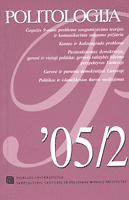Racionalumo Ir Teisingumo Trintis Johno Rawlso „Teisingumo Teorijoje“
Friction Between Rationality And Justice In John Rawls’s „A Theory Of Justice“
Author(s): Nida VasiliauskaitėSubject(s): Law, Constitution, Jurisprudence
Published by: Vilniaus universiteto leidykla & VU Tarptautinių santykių ir politikos mokslų institutas
Summary/Abstract: John Rawls’s famous „A Theory of Justice“ firmly established itself as a classical work in the field of political philosophy. There is a huge mass of critical literature on it dealing with variuos details and aspects. Yet it seems nobody noticed some fatal internal inconsistency at the very basis of the project. That is, the fact that Rawlsian aim to make a theory of justice more geometrico diverges from his explicit belief in the unconditional value of justice and its conceptual independence of rationality. This belief is an essential part of the „Theory“ no less than the attempts to ground it on reason. But to ground justice on reason means exactly to destroy its conceptual autonomy and unconditionality. That is the problem the article concentrates on. It shows that, firstly, Rawls makes not clear enough which ideal – this of justice or that of rationality – he takes as self-grounding and of the ultimate importance when compared with each other. On the one hand, the willingness to use the model of the original position stems from purely moral, that is, unreducible to utility maximizing calculations, state of consciousness, without which the persons cannot be persuaded to take part in the mental experiment and to perceive it as just. On the other hand, Rawls declares the need to ground the principles of justice and to prove that unjust behavior is also irrational, which means he questions the very belief in the binding power of Kantian morality together with his own quest for justice (If justice is nothing other than rationality, so why should we worry about it? Let’s speak instead about rationality and utility alone). Secondly, we demonstrate that although a famous veil of ignorance needs because the persons under it are homini economici, that is, rational egoists without any moral sentiments, yet this veil is possible and usefull only if the homini are supplied with a sense of justice, which means that the initial definition of the persons is destroyed. Moreover, in this case the veil is superflous because the supposed sense of justice takes on the function of it. Thirdly, a contradiction in terms between two fundamental pressupositions of Rawls’s theory – Cartesian universal reason of solitary thinker on the one hand and contractarian conception of justice on the other – is exposed: what becomes of the idea that justice is the result of a rational agreement, if each person finds the principles of justice individualy and needs no communication? Fourthly, communitarian critique of Rawlsian claim to universality and impartiality is briefly presented and discussed in order to show that to be rational is not the same as to be neutral, fair and impartial. Moreover, no matter what we think about the possibility to be fair, at least the state of being both rational and fair (or just in Rawlsian sense) is unattainable.
Journal: Politologija
- Issue Year: 2005
- Issue No: 4 (40)
- Page Range: 053-078
- Page Count: 26
- Language: Lithuanian

